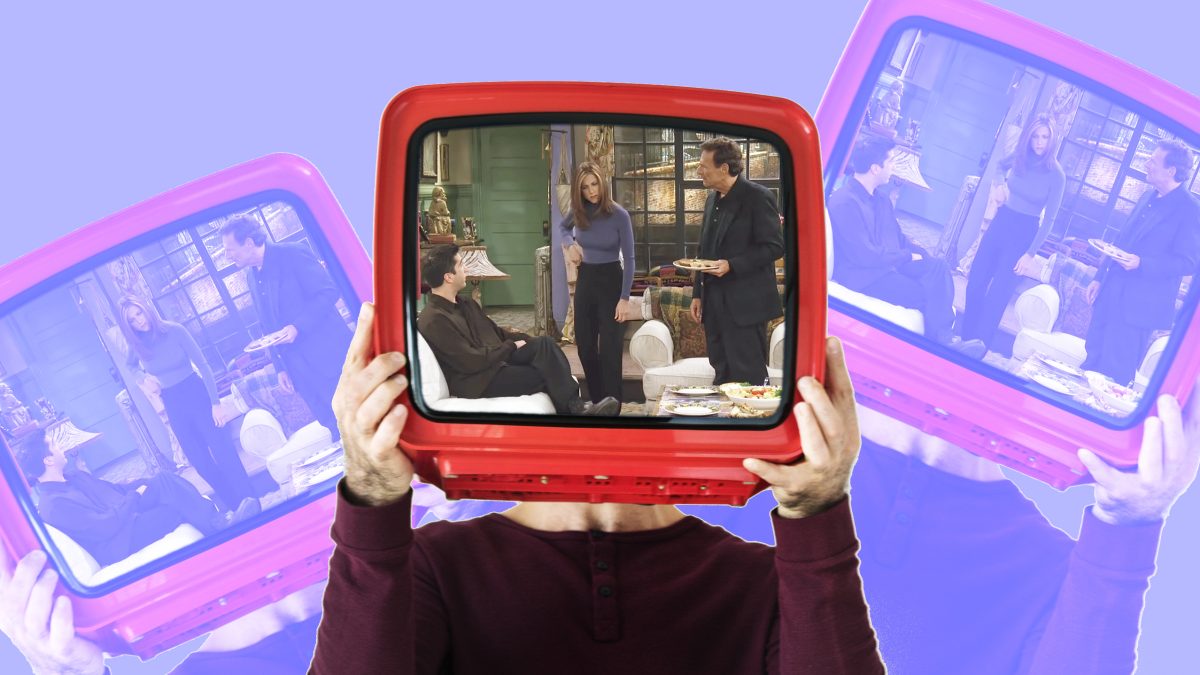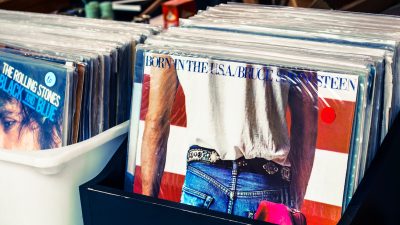Arts & Culture Television
’90s Sitcoms Don’t Hold Up Well—But They Once Held My Family Together
I knew on a level the humor was cringeworthy, especially as a recently out gay boy facing heterosexist gender roles, but I didn’t care. I needed “Friends” to make our house feel less lonely and empty.
When I came out to my dad, it was by force.
“When you get home, can you come into my room?” I texted him, knowing I wouldn’t be able to simply initiate the conversation in person.
I usually wouldn’t force myself to do anything I was uncomfortable with, but this situation felt different. I had just come out to my mom the day before and I knew my dad would be hurt if he found out I didn’t tell him around the same time. They had just split up and I didn’t want to show favoritism.
When he got home, my dad walked through our now barren house and up the stairs to my room. The second he walked in, I burst into tears. For the next half hour, we played the most uncomfortable game of twenty questions as he tried to narrow down the source behind my crying.
“Have you done something bad?” he asked.
I shook my head.
“Did you get someone pregnant?”
I shook my head again, wondering to myself if he’d prefer that over the truth.
“Is it something you think you are? Do you think you’re gay?”
I didn’t nod, but I cried enough that I didn’t need to.
He wrapped his arms around me and just repeated, “It’ll be okay. It’ll be okay.”
My dad grew up in Iran and although he’s always been liberal, especially since marrying my mom, I had no precedent for knowing how he’d react. It’s one thing to be supportive of gay marriage, it’s another when it’s your son.
Oh, how much easier it would have been if I told my parents at the same time, before they got divorced. The sad truth is, my dad and I weren’t close, and now we lived alone in the remains of our once lively family home. For years, my dad had been working long hours to try to keep his small business afloat during the 2008 economic recession. So ever since my parents ended their marriage in 2009, living together, just my dad and me, felt like living with a stranger.
I wouldn’t know it until years later, when I went off to college, but living with my dad in those years felt similar to living with my freshman year roommates in a dorm—spending a lot of time in bed and making small talk in the common areas.
In an unspoken agreement to keep things positive, my dad and I would eat dinner and watch TV together basically every night. We’d eat a meal he prepared, which usually consisted of six different kinds of beans, and turn on whatever Friends episodes we had on DVR.
It was in these moments we both found ease. Who needs to make small talk about school when Monica accidentally gets a race car bed delivered and Ross and Rachel have a terrible dinner with her stingy father? We don’t need to hear the echoes of our empty house when laugh tracks are playing!
’90s sitcoms, especially compared to comedy or drama shows of the ’10s, were great for my dad, who is not a native English speaker. Even though he speaks the language pretty fluently, following along with a confusing narrative—like anything that happens beyond the first season of The Good Place —can require concentration that he might not want to exert at the end of a tiring day moving through the world in a second language.
A show like Friends is easy to understand. If the situational humor or the slapstick don’t make the humor obvious enough, there’s a studio audience telling you when to laugh. These days, though, it’s hard for me to get through even a few episodes because some of its jokes haven’t aged well. For example, one of the running jokes throughout the series is that Monica used to be fat and, in flashbacks, Courtney Cox (who plays Monica) would wear a fat suit for a cheap sight gag.
The punchlines are many shades of problematic. And even when they weren’t direct jokes, more than a few episodes focus on a plot of one of the men confronting gender in some capacity, like when Ross has a problem with his son playing with dolls, or when Joey has a crisis because he finds women’s underwear comfortable to wear.
Though I find these scenarios cringeworthy now, when I was growing up, they were my comic saviors. I knew on some level that the humor was messed up, especially as a recently out gay boy who struggled with heterosexist gender roles, but I didn’t care. I needed them to make our house feel less lonely and empty.
Too soon after the divorce, my dad’s new girlfriend moved in to our family home. Despite the additional person, our house only felt emptier. Before my parents split, my mom was a big homemaker. The design of our home was meticulous and detailed; she even taught herself AutoCAD so she could redesign our kitchen. When she left, her eye for detail did as well. Our completely redesigned kitchen now started to become grimy—everything that teenage Ryan took for granted was now gone.
My dad, who was aggressively trying to make this whole situation seem as normal as possible, would still make us eat our nightly dinner together. It was clear to me, even at the time, that my dad was trying to mask his own hurt by forcing a new family arrangement. But it didn’t make it less awkward. He would constantly rave how good of a cook his new girlfriend was despite us both knowing the truth. (Hot dogs with cheese and pickles on white bread are not delicious, Dad. Sorry.) He liked to claim that she was well-traveled when, really, she just had a British accent.
During this tumultuous time as well, Friends served as a break in the overall discomfort of my home life. I would be called downstairs for dinner and immediately turn on an episode before I even grabbed my plate of food—couldn’t give my dad a chance to say anything uncomfortable.
I knew on some level that the humor was messed up, especially as a recently out gay boy who struggled with heterosexist gender roles, but I didn’t care. I needed them to make our house feel less lonely and empty. Shortly after I came out, when we were driving on the freeway, my dad pointed out a cop who had pulled someone over.
“Look at that,” he remarked. It took me a second to even register what he was talking about, but then it hit me. The cop was a woman and my dad was trying to bond with me over finding her attractive. In my entire life, before that moment or since that moment, I can not recall a time my dad has commented on a women’s appearance.
That incident was a clear indication to me that my dad didn’t know what he was doing. I’d found out later that, during this time, he would talk to my mom on the phone to get advice on how to handle my coming out. I bet watching Friends at dinner wasn’t just a break for me, but also a break for him. My dad was constantly worried about fucking up and fucking me up. But if I just blasted Friends through our surround-sound speakers, the white noise of their white antics would drown out our worries.
I don’t want to let Friends off the hook. While the show was written in a different era when conversations about identity and representation in media were different, it’s more than fair for people to feel negatively about Friends’ s firm place in the canon of television history (Netflix paid the show’s owner WarnerMedia $100 million to keep the series streaming on the platform)—especially when shows like Living Single and Good Times are not regarded in the same way. Like many shows of the time— Seinfeld , Will & Grace (the original series)—it’s difficult to watch Friends in 2019.
Despite any positive memories I have with the show, it’s impossible to escape the transphobic jokes about Chandler’s trans mom (played by Kathleen Turner, a cisgender woman; the character was often referred to as “he” and Chandler’s “gay dad” and although the character was never seen outside of female clothing, she was often just called a drag queen), some weird gender stereotyping (like when Ross can’t get over the fact that his nanny is male), or the realization that the show featured only two Black women (Gabrielle Union who was around for one episode and Aisha Tyler who was in nine episodes), both of whom were romantic interests for Joey and Ross.
Even in the episode with the race car bed, after Ross and Rachel’s dad get into a tiff over the appropriate tip for their waiter, they end up bonding over their complaints about Rachel and how they both try to patronize her—you know, just guy stuff.
Even with all of that in mind, I feel like I owe something to Friends . I would be lying if I said it didn’t laugh at those jokes once upon a time and I would be lying if I acted like it didn’t have an impact on me during a sensitive time in my life. But that’s fine. Both of those perspectives be true simultaneously. Its sense of humor can stay back in 1999 and my relationship with the show can stay back in 2009.
Modern comedies don’t have the same effect on my dad that the ’90s ones did. Over the times I’ve visited him as an adult, I’ve tried showing him episodes of The Good Place or Veep . While he sometimes laughs, a lot of the subtle bits are lost on him. Comedy shows have evolved a lot since the early 2000s: There are multiple complex narratives to follow and the consequences of an episode have lasting effects on the series. My busy entrepreneur father doesn’t have the time for all that.
But luckily, it doesn’t really matter anymore if we like the same TV shows. I can watch The Office and he can watch Madam Secretary , The Blacklist , or whatever other network drama that hasn’t gotten cancelled yet. I don’t need that bridge anymore to talk to my dad. Over the years, especially after I moved from my hometown in California to New York for college, we’ve grown closer and our differences have seemed smaller. We started to talk on the phone more often and, when I’d visit home, we’d genuinely enjoy our time together. I began to appreciate the plethora of beans he’d make for dinner and all of the times he tried to act like a family with me.
One afternoon, when I was visiting my dad for Thanksgiving last year, we were driving to a new lunch spot he wanted to show me. There was a lull in our conversation and I was scrolling through my phone. Out of nowhere, my dad asked “So, are you seeing anyone?”
To say I was shocked would be an understatement. My dad and I had vaguely talked about my sexuality in the years since I came out, but never anything so direct. I got over my surprise and told him I was seeing someone, but it wasn’t that serious.
I lied. I’d been with my boyfriend for almost a year at that point and I thought of it as pretty serious. My dad asked a few formal questions about my boyfriend: Where does he live? What does he do for work? It felt like my dad was interviewing him for an admin assistant role at his company.
I’m not sure why I lied to my dad. I guess I didn’t want him to think I was keeping anything from him, after how much we’ve worked on our relationship. Maybe I was not yet ready to merge those two parts of my life. However, when I am ready, I’m confident my dad and I will be able to talk about it openly, without the buffer of an outdated sitcom.







